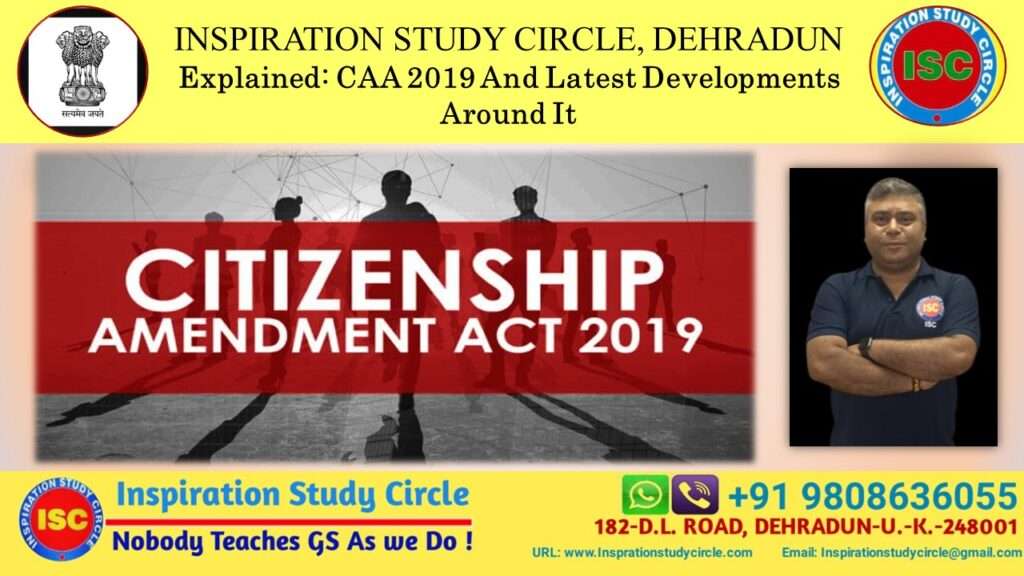
Inspiration Study Circle Explained: National Gopal Ratna Awards
The Department of Animal Husbandry and Dairying under the Ministry of Fisheries, Animal Husbandry and…
Citizenship is a legal status and relationship between an individual and a state that entails certain rights and duties. Citizenship in India is listed in the Union List under the Constitution and is therefore under the exclusive jurisdiction of Parliament. The Constitution of India, dated January 26, 1950, established the categories of persons eligible for Indian citizenship. It also empowered Parliament to regulate additional aspects of citizenship, such as grant and relinquishment. Under this authority, Parliament enacted the Citizenship Act, of 1955.
The Citizenship (Amendment) Act, 2019 (CAA) was passed by the Parliament of India on 11 December 2019. It amended the Citizenship Act, of 1955 by providing a fast track to Indian citizenship to persecuted religious minorities from Afghanistan, Bangladesh, and Pakistan. As of 2014 in India. Eligible minorities were Hindu, Sikh, Buddhist, Jain, Parsi or Christian. The law does not grant such eligibility to Muslims in these countries. The act was the first time when religion was explicitly used as a criterion of citizenship under Indian law and drew global criticism.
Under the 2019 amendment, migrants who entered India by 31 December 2014, and suffered “religious persecution or fear of religious persecution” in their country of origin, were made eligible for fast-track citizenship. The amendment relaxed the residency requirement for the naturalization of these immigrants from 12 years to six years. As per the Intelligence Bureau records, there would be just over 30,000 immediate beneficiaries of this law.

The Indian Constitution enacted in 1950 guaranteed citizenship to all residents of the country at the time of its inception and did not discriminate based on religion. In 1955, the Government of India passed the Citizenship Act, which granted citizenship to all people born in India subject to certain limitations. The act also provides two means for foreigners to acquire Indian citizenship. People from “Undivided India” were given the means of registration after seven years of residence in India. People from other countries were given the means of naturalization after twelve years of residence in India.
The Parliament of India passed the Citizenship (Amendment) Bill in 2015. It was passed by the Rajya Sabha on 4 March and earlier by the Lok Sabha on 2 March 2015. The Bill replaced the Ordinance issued in this regard and amended the Citizenship Act of 1955. The key provisions were:
The Citizenship Amendment Act in India is derived from their original constitution under Articles 5-11 and the Citizenship Act 1955. The Act provides for citizenship by birth, descent, registration, and naturalization. It amended the Citizenship Act of 1955 to make Hindu, Sikh, Buddhist, Jain, Parsi, and Christian illegal immigrants from Afghanistan, Bangladesh, and Pakistan eligible for Indian citizenship.
CAA Rules 2024: Application for citizenship under the CAA is governed by Section 6B of the Citizenship Act, 1955. Applicants are required to prove their country of origin, religion, date of entry into India, and knowledge of the Indian language to be eligible. Indian citizenship.
Proof of Country of Origin: Relaxed requirements allow a variety of documents including birth or educational certificates, identity documents, licenses, land records, or any document proving previous citizenship of specified countries.
Date of entry into India: Applicants can provide up to 20 different documents as proof of entry into India, including visas, residence permits, census slips, driving licenses, Aadhaar cards, ration cards, government or court letters, birth certificates, and more.
Illegal Immigrants: An illegal immigrant who enters India without valid travel documents or overstays the permitted time, potentially faces prosecution, deportation, or imprisonment.
Relaxation: The amendment relaxed the residency requirement from 11 years to 6 years for these communities to acquire Indian citizenship through naturalization.
It exempts members of these communities from prosecution under the Foreigners Act of 1946 and the Passport Act of 1920.
Applicants are exempt from being considered “illegal immigrants”.
Exceptions:
Consequences of acquisition of citizenship: It states that on acquisition of citizenship:
Reasons for cancellation of OCI registration: The 1955 Act allows the Central Government to cancel OCI registration on various grounds, adding a new ground for cancellation if the OCI violates the legislation proposed by the Government.

The Department of Animal Husbandry and Dairying under the Ministry of Fisheries, Animal Husbandry and…

The center draws attention to anti-paper leak law amid the row of NEET and UGC NET exams: Rs 1 crore fine, up to 10 years in jail for offenders……

The Krishi Sakhi Program is an initiative implemented in various states of India to empower women …..
The Union Public Service Commission (UPSC) is all set to conduct its CSE Prelims Exam, tentatively on 26th May 2024…

The Union Public Service Commission (UPSC) released the results of the Prelims …

Union Public Service Commission (UPSC) has announced the Exam….